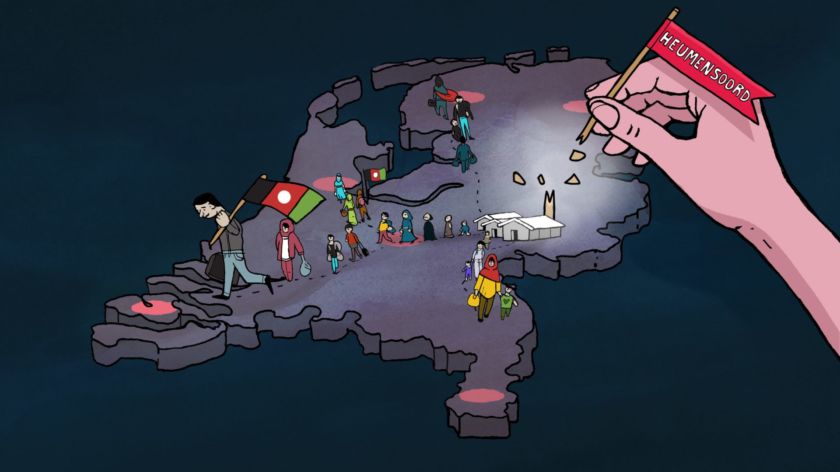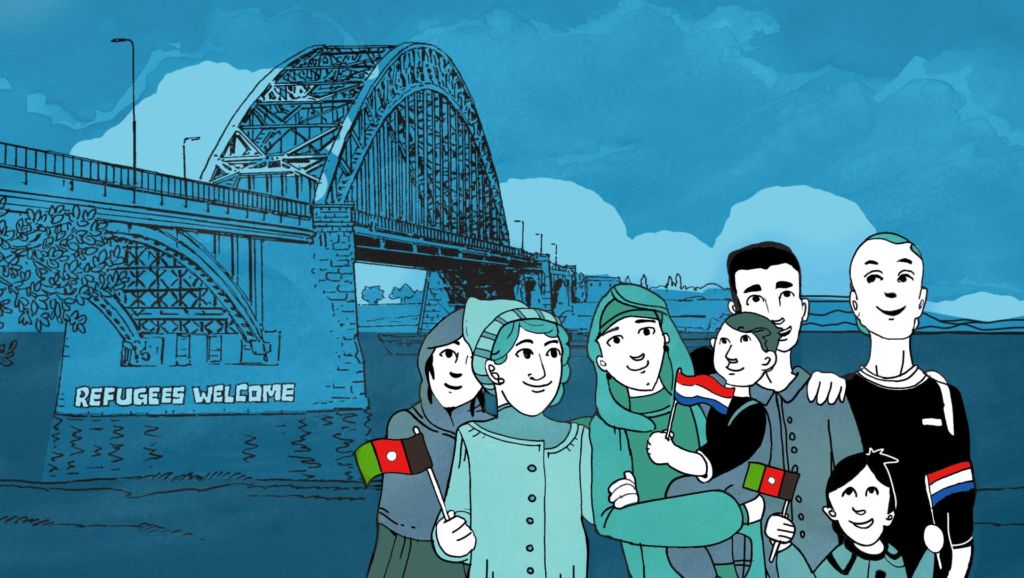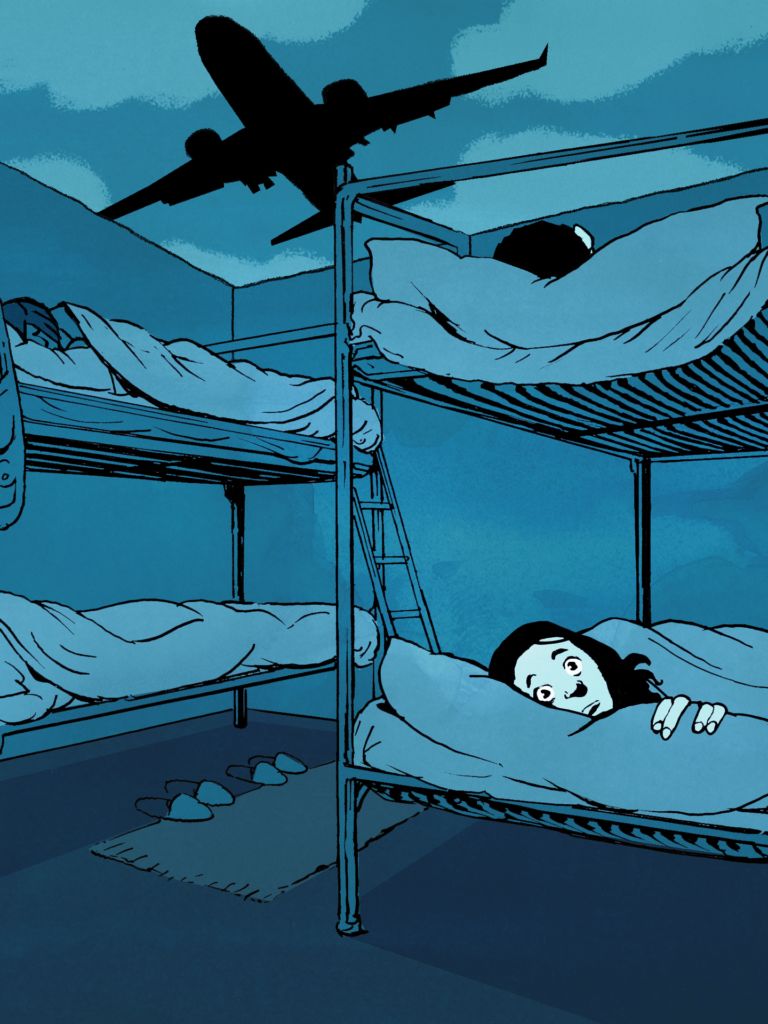-
 Illustration: Ivana Smudja
Illustration: Ivana Smudja
This month, the last of the refugees from Afghanistan left the emergency shelter in Heumensoord for several refugee centres across the Netherlands. Three of those refugees look back on their time spent in the nature reserve in conversations with Afghan journalist G., who also stayed in Heumensoord. ‘Nijmegen is nice and the people there are very friendly, but the camp was horrible.’
Around a thousand Afghan refugees stayed in the emergency shelter in Heumensoord since the end of August 2021. They fled their country after the Taliban’s coup. The refugees slept in the woods near Radboud University in white pavilions, with very little privacy and a lot of noisy nights. A small group attended classes at the university.
This article was written by G., who worked as a journalist in Afghanistan and spent three months in the emergency shelter in Heumensoord. For reasons of privacy, he did not want to write it under his real name.
According to the Netherlands Institute for Human Rights and the National Ombudsman, the emergency shelter at Heumensoord was unsuitable for long-term stay. Early December 2021 saw the start of moving refugees to the various refugee centres spread out across the Netherlands. Three Afghan refugees who stayed in Heumensoord look back on their time in the emergency shelter.
Mohammad: ‘In Heumensoord one could not forget the anxieties brought from home’
The decision to leave Afghanistan was neither easy nor a choice, but a necessity for Mr. Mohammad Sabir Hotak (31). Mr. Sabir personally worked with the Royal Dutch army as an interpreter. Since then, he never thought of leaving Afghanistan, although living there was never without dangers.
‘I had the option of leaving Afghanistan, but I didn’t, as we had that glimpse of light for the future generations that would lead to end misery and to get out of the cycle of wars. There were tremendous shortcomings in the previous government but at least we were moving in a promising direction and walking along the nations of the world.’
On 15 August 2021, that light of hope vanished when the Taliban took over the power in Afghanistan. ‘We were pushed into another dark era, which is uncertain in many ways. The only certainty we have right now is that we have lost whatever progress we had made in the last two decades. That is when I decided to move out of the country and take refuge in a secure place, for myself and for the betterment of my children at least.’
Shocked, heartbroken and devastated, the family torn apart, looming with uncertainties and fear; Mr. Sabir and his family entered this new environment. ‘Apart from a few incidents, we had a warm and friendly welcome here in the Netherlands.’ Stepping into a new society without knowing the language or having a proper understanding of the people and culture created a lot of moments of culture shock. ‘But every time, one finds good, helping people around who are genuinely helpful and very supportive. Meanwhile, I moved to different locations, each with its own pros and cons. Heumensoord was not a good experience and became mentally exhausting for many people. It was not a place of healthy living or a place where one could forget the miseries and anxieties brought from home.’
‘Living in Heumensoord became mentally exhausting for many people’
In Mr. Sabir’s view, Heumensoord multiplied those anxieties and uncertainties. ‘The camp’s administration played a major part in this; they created a sense of unwelcome and alienation. They could have avoided this by simply respecting the cultural values, sensitivities and norms of the inhabitants while running the official system as intended. But they preferred an authoritarian and coercive approach, and that certainly produced very bad memories for the people living there.’ Sabir’s family has now been transferred to the refugee centre of Nijmegen.
Outside of the camp he met the amazing people of Nijmegen. For him they became a source of escape from the anxieties and stress inside the camp. ‘Every now and then I could meet people who are wholeheartedly willing to help you in any way they can. The people of Nijmegen are very friendly and supportive. I made several amazing friends here, and they became a source of strength and support during my stay at Heumensoord.’
Mr. Sabir got admission to a course at Radboud University; He calls it a blessing in the dark. ‘As an anthropologist with a background in psychology as well, I applied for a course in Interpersonal Relationship in the psychology department. Although I have a masters’ degree in the field, I joined a bachelor level course at the university to find an escape out of camp life. No matter how short, but it was worth it. I also wanted to learn in order to get to know the educational system in the Netherlands, and a prestigious place like Radboud was a life-changing opportunity.’
‘The department was very friendly and cooperative. The student advisor placed special focus on helping me. I was provided with materials and a laptop for the study. I got major help to get back on track with my educational career, as I look forward to starting my PhD track soon. I see my future as an educator, or at a think tank in the European Union or the UN. Radboud University provided me with the impetus for my dream to come true – to get an admission for my PhD – and I hope to build on it in the future and give back to this amazing Dutch society as well as help my home country Afghanistan.’
Matiullah: ‘It was very difficult to see Afghanistan fall into the hands of the Taliban’
Matiullah Momand is a resident of the Rodat district of Nangarhar province, east of Kabul. He is 38 years old and he has served as interpreter with the royal Dutch army in the Urozgan province of Afghanistan. That is why he couldn’t stay in Afghanistan anymore after the collapse of the Afghan government and withdrawal of all ISAF and coalition forces from Afghanistan.
Matiullah also had a private business in Afghanistan: he was importing electrical products and veterinary medicine from abroad to Afghanistan, with good income.
‘Before August 15th, 2021, some friends from Kandahar and Nangarhar were at my guest house in Kabul. Because the government in other parts of Afghanistan had already collapsed and my friends have worked for ISAF before, on the 15th of August we decided to go to the airport to escape Afghanistan, but there was no chance. There were very bad situations everywhere in Kabul; armed groups of Taliban were seen. So we returned to my guest house. There was a lot of chaos; it was very hard to reach the airport until the 24th of August. Me and my family had to pass a 2-meters deep canal half full of wastewater; a memory I will never forget.’
Matiullah, his wife and two children are happy because he was treated very well during the evacuation to the Netherlands. ‘After the fall of the Afghan government, our chances of leaving Afghanistan were slim. Me and my family entered Kabul airport with a lot of difficulty. After a journey of a day and a night, we reached to the Netherlands.’
‘Nijmegen reminds me of a part of Kabul, I will visit it often’
Matiullah has been living in the Netherlands for about four months. When he first reached the Netherlands, he spent about one month in Harskamp. Then he moved to Heumensoord in Nijmegen. After spending more than three months there, his family relocated to AZC Paterswolde.
‘It was very difficult to see Afghanistan fall into the hands of the Taliban with my own eyes. It was very difficult for me to leave the country. The hardest part of my life was living in Heumensoord. There was no privacy and a lot of noise because of the construction of the camp. But luckily there the people around Heumensoord were nice and hospitable. I miss Nijmegen very much. It reminds me of a part of Kabul, and I will visit it often.’
Matiullah would like to become a vehicle mechanic in Holland, as he knows a lot about vehicles and loves running his own business. He left a big family in Afghanistan, and he misses them very much because he had a good time with them, but now his family is also living in fear.
Sahila: ‘We hope to have a home of our own in the future’
Sahila is a 24-year-old resident of Nangarhar Province, Afghanistan. Her husband worked as an interpreter for the Dutch forces in Kandahar province. When Afghanistan fell and was captured by the Taliban, it was difficult for her husband to stay in the country.
‘Prior to the fall of Afghanistan, my husband sent his immigration documents to the Netherlands in order to obtain a legal visa for us to emigrate. Those who have worked with foreign forces in Afghanistan face serious threats.’
‘We had also received travel documents from the Netherlands, but unfortunately then Afghanistan fell. Two weeks after the fall of Afghanistan, my husband received a call from Dutch embassy staff urging us to rush to Kabul and relocate to the Netherlands in the next few days.’
Sahila and her husband stayed at a hotel in central Kabul and waited for the embassy to allow them access to the airport. ‘My husband got a call from the embassy and showed me a specific area so that I could reach him very quickly. When we arrived at the airport, it was very busy and the chances of entering the airport were very low, as thousands of people were waiting to.’
‘Living in one room with several families is very difficult’
After a long wait, Sahila and her husband were escorted to the airport by Dutch forces. In all, it was an eight-hour flight. ‘We spent a week quarantined in Amsterdam when we arrived in the Netherlands, thinking we would be there for a long time and then have a home and a better future. But this proved to be false. Suddenly, I was told to prepare myself to move to another area. After a three-hour journey, we were relocated to the Nijmegen, Heumensoord area, where a tent camp for Afghan refugees had been set up.’
‘For us it was the hardest moment of our lives, as six people had to live in tents and a family of less than six would have to share with several other families. That made it very difficult for us. Living in a room with two families and six people is very difficult. No religion or culture allows living with different family members in one room, where there is no privacy.’
For Sahila and her husband, it was one of the bitterest times of her life, and she spent more than three months in the tents, suffering from memory loss, lack of sleep and lack of proper food. ‘We didn’t get any money during our stay in the camp and our equipment was not up to standard. So I was forced to buy food and other necessities with my own money, which I had brought from Afghanistan.’
‘Nijmegen and especially Heumensoord is a very beautiful place, and the love of the people will always be in our heart, but I won’t forget the nights spent there in hardships until I die.’ Sahila and her husband are now living in the AZC in Delfzijl. ‘We hope to have a home of our own in the future, learn the Dutch language and get a good job.’





